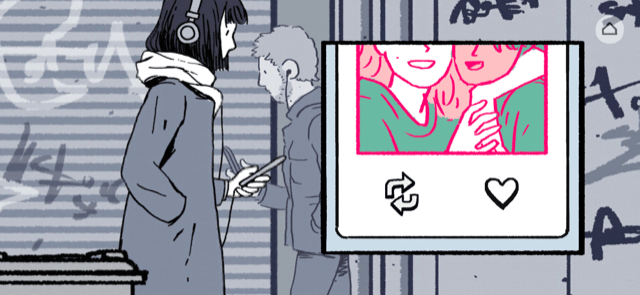The tender new iOS game Florence is, yes, the sort of game I tend to champion, the sort of art that feels particularly crucial and nourishing in this period of intensified violence, cruelty, and dehumanization. A narrative game that tells the story of how a young woman’s life is changed when she and a musician meet and fall in love, Florence is both a beautiful game and also a game about beauty—the beauty of creation, color, and connection.

I delighted in the way it merged gameplay and narrative, as it does early on by mimicking the doldrums of its heroine’s life through mundane scenarios like having you look through colorful, Instagram-esque photos as Florence, her world washed out, heads to her dull job in the morning. However, I can’t talk about what I admired most about this game without discussing its ending, so if you haven’t already done so, go play it now. It’s $2.99 and might take you 45 minutes or so to complete. Then come back.

From start to finish, Florence does a remarkable job of using simple interactions to effectively root you in the character’s life. As someone who often finds conversation challenging, and who knows the rare feeling of encountering someone special with whom things just click a little easier, I was especially wowed by the elegant section in which we experience Florence finding such a connection with Krish, a cellist whose music sweeps her off her feet.
I’d never felt my own specific social struggles represented in gameplay so relatably before, and the gradual evolution of Florence’s interactions with Krish from effortful to effortless made me feel an investment in their relationship, because I know how hard and how wonderful it can be to find someone who, just by being themselves, makes it all make a little more sense.
However, Florence only truly cemented itself as something special in my estimation once things fall apart for Florence and Krish. It’s a heartbreaking sequence in which all the color that had flowed into Florence’s life thanks to Krish’s presence evaporates, and the weight of his absence is, for a time, felt everywhere.
Then, one day, things begin to change, and Krish’s true, lasting impact on Florence’s life begins to reveal itself. Seeking a creative outlet for her feelings, Florence turns to a long-forgotten watercolor set Krish had once given her in an effort to encourage the artistic inclinations she’d set aside ages ago, and with it, she begins to explore a part of her that she’d ignored for so long. Through this process, she finds that there can still be color in her life, that, indeed, there was color inside her all along.
In the end, there’s an exhibition of her work, and to be honest, I really thought I knew what was going to happen here, as Florence approached attendees and made polite conversation with them about her paintings. I thought for sure that somewhere among them, standing off on his own with his back to her, would be Krish, admiring one of the paintings. I thought that she’d approach him, he’d turn around, they’d smile at each other, and that the game might end right there, leaving us with the possibility of them getting back together lingering in our minds as we bid Florence farewell.
But none of this happens. Instead, we part ways with Florence as she enjoys a cup of coffee or tea at home, looking content, her easel with a work in progress taking up space in her apartment, her cat curled up on a stool. Florence, the game, knows that Florence, the person, doesn’t need to be paired up with someone to be complete. That’s not to say that she might not be hoping for a lasting love, or that we shouldn’t want that for her. I do want that for her. It’s just to say that she, unlike so many female characters in romantic films, novels and other creative works, isn’t portrayed as fundamentally lacking something if she’s not in a relationship. We’re not left seeing her as any kind of failure because she’s not paired up. We’re thrilled for her successes and her progress toward becoming much more self-actualized. Despite being single just as she was when we first met her, meaningful change has occurred. Florence is a very different, much more fulfilled person at the end of the game than she is at the beginning.
Even though things don’t work out between her and Krish, these are two people who changed each other’s lives for the better, and not in the formulaic, highly gendered ways that people so often do in love stories. There are no male saviors or manic pixie dream girls here, no fucked-up power dynamics or stalker-y behaviors passed off as romantic; just two characters who, without a single word of spoken dialogue, still manage to come across as fully realized, individual people who care about each other. Florence encouraged Krish to pursue music, and Krish encouraged Florence to paint. It wasn’t a case of one person nurturing or rescuing the other, but an example of mutual support, encouragement, and love. They did something for each other that I believe love can and should do in our lives: they gently helped each other become better versions of themselves. We should all be so lucky.
